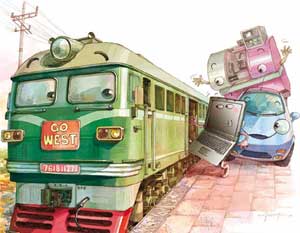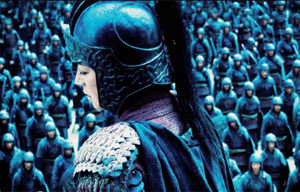Driving forces on the road
Updated: 2011-10-23 08:36
(China Daily)
|
|||||||||
Beijing: Dilemmas behind the wheel
At 5:45 am, Sun Yongquan shakes off the three hours of sleep he has stolen while parked under Madian Bridge, gulps down a pancake and starts cruising for customers.
This is how the 41-year-old taxi driver, who has already been on duty for 18 of the 24 hours of his shift, begins his Mid-Autumn Festival.
He'll earn about 200 yuan fewer today, as people spend the holiday with their families. About half his usual business comes from ferrying workers between their offices and homes, he says.
"Traffic is great today, even during the 8 am rush hour," he says. "But if every day were like this, I'd be broke."
Sun brings home a little more than 3,000 yuan ($469) a month after paying nearly 3,400 yuan for cab rental and about 9,000 yuan for gas.
He usually gets up at 8:30 am and, starting at noon, works for 24 hours before sleeping 13 hours.
"All I do is work and sleep," he says.
He often naps from about 3 am until 6 am beneath Madian Bridge, a gathering spot for drivers in northern Beijing.
He usually skips breakfast, delays dinner until about 9 pm and has adapted to drinking only a 550-milliliter bottle of water a day to avoid bathroom breaks.
"Life's no fun anymore," says Sun, who used to enjoy fishing and jogging.
"It's out of control."
Such working conditions for drivers, and other factors, including Beijing's restrictions on new license plate issuances, have caused the demand for taxis to outstrip supply, allowing drivers to be picky about their fares.
The Beijing Municipal Committee of Transportation responded to increasing customer complaints by issuing new requirements before September.Drivers must work despite bad weather, during holidays and refrain from switching shifts during rush hour. Beijing Today reports violators will be "severely punished".
"I'll take any fare but understand drivers who don't want to go short distances or take someone way north of the city if they have to transfer their cab to another cabbie in the South because they might miss their deadline to swap cars," Sun says.
"And some cabbies would rather nap during rush hours, when the road conditions are really bad."
The fine for being the subject of a complaint is 2,000 yuan, Sun says. "That's about two-thirds of my monthly income!"
Illegal or pirate taxis, known as "heiche (black cars)", are proliferating to fill the gap.
A city inspector, who would only give her surname, Gu, explains she spends her workday cracking down on heiche but often must then hire one to get home.










